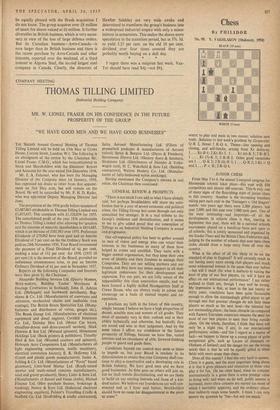Chess
By PHILIDOR No. 99. Y. VAKHLAKOV (Shakmaty, 1954) BLACK (10 men) WHITE (5 men) WHITE to play and mate in two moves: solution next week. Solution to last week's problem by Groenveld: Q-R 2, threat 2 R-Q 6. Theme—line opening and closing, and self-blocks, arising from Kt defences.
1 Kt-B 4; 2.Kt-Kt 5. 1 ... Kt (6)-K 5; 2 R-B 3. 1 . . . Kt (7)-K 5; 2 R-B 2. Other good variations are 1 Q-K 3; 2 R (6)-B 5, Q-R 3; 2 Kt x Q and 1 P x R; 2 R-Q 4.
JUNIOR CHESS From May 2 to 4, the annual Liverpool congress for Merseyside schools takes place—this year with 836 competitors and almost 100 reserves. This is only one of many signs of the flourishing state of junior chess in this country. Another is the increasing numbers taking part each year in the 'Teenagers v. Old Stagers' match: two years ago there were 2,200 players, last year 2,600, and this year over 3,000 took part. One of the most interesting—and important—of all the developments in schools chess is that, starting in September this year, there will be a national schools tournament played on a handicap basis and open to all schools; this is jointly sponsored and organised by the Sunday Times and the British Chess Federation apd, judging by the number of schools that now have chess clubs, should draw a large entry from all over the country.
What is the effect of all this likely to be on the standard of play in England? It will certainly result in our having many more strong club players and much, more widespread interest in the game than ever before —but will it result (for what it matters) in raising the level of play of our best players, i.e. will it have an effect on our international performance? I am rather inclined to think not, though I may well be wrong. My impression is that, at least in the last twenty or thirty years, conditions have been quite favourable enough to allow the outstandingly gifted player to get through and that postwar changes do not help these players so much as the next level—the talented but not outstanding player; the basic obstacle (as compared with Eastern European countries) remains the need for most of our best players to earn their living outside chess. On the whole, therefore, I think that there will only be a slight rise, if any, in our international performance, unless—and this I regard as a matter of luck—we happen to throw up a young player of quite exceptional gifts, such as Larsen of Denmark or Olafsson of Iceland; and the danger (to use the wrong word) then is that he will be equally gifted in other fields with more scope than chess. Does all this matter? I find this very hard to answer. Chess is a game, and the most important thing about it is that it gives pleasure and relaxation to those who play it for fun. On the other hand, when we compete internationally in a game there is some prestige value in doing well; and when we do well, public interest is increased, more chess columns are started (an event of' which I inevitably approve), and the ordinary player thus indirectly reaps some benefit. I think I can only answer my question by 'Yes—but not too much.'






























 Previous page
Previous page